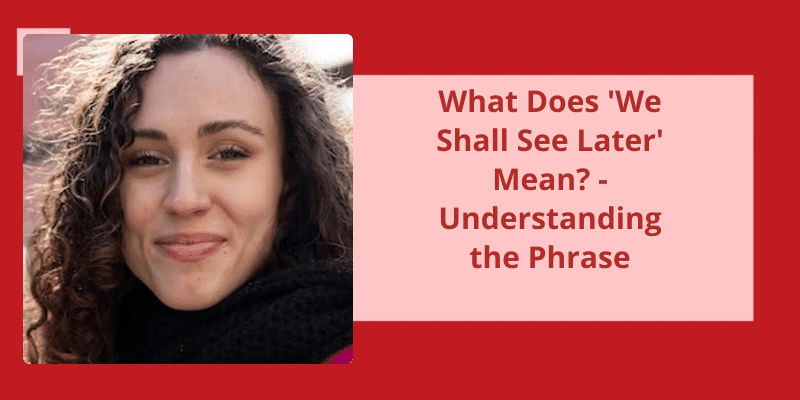The phrase "we shall see later" carries with it a sense of anticipation and expectation, indicating a forthcoming meeting or event that will be discussed or experienced in more detail at a later time. It’s commonly used as a parting phrase, especially among individuals who know each other and have plans to reconvene soon. This phrase captures the sense of excitement and curiosity that often surrounds future events, highlighting the idea that there’s more to come and encouraging a sense of eagerness or anticipation.
What Does It Mean When Someone Says We Shall See?
When someone says, “we shall see,” it’s often a way to express a sense of uncertainty or anticipation. This phrase is often used casually to express that what happens next is unpredictable, and the speaker is eager to find out what it is. It can be a way to convey a sense of excitement or curiosity about the future, and it’s often used in conversation as a polite way to end a discussion or express a sense of hope that something might happen in the future.
It can be a way of suggesting that there might be consequences to actions that are taken in the present, and that the outcome of those actions is unpredictable. This can be a way of expressing a sense of caution or concern about the future, and it can be used to caution others against engaging in risky or unpredictable behavior.
Whether it’s used to express excitement about the possibilities that lie ahead, or to suggest a sense of caution or concern, this phrase is a versatile and useful way to communicate about the future and all of it’s uncertainties.
What “we shall see” truly means is that the future isn’t something that any one person can control or predict with absolute accuracy. It’s a blank slate that’s waiting to be filled with the choices and actions of those who inhabit it. Each person must find their way forward, making their own choices and taking their own risks, and ultimately, they must accept the consequences of those choices.
By doing so, we open ourselves up to the possibilities and opportunities that lie ahead, and we can discover the true joy and wonder of our lives.
Now that we’ve a better understanding of what “see you later” means, let’s dive deeper into it’s usage and the different contexts in which it can be used.
Does See You Later Mean Goodbye?
The phrase “see you later” is a casual and friendly way to let someone know that youll be leaving, while also implying that youll be seeing them again at some point in the future. The phrase can be used in a variety of contexts, from saying goodbye to co-workers at the end of the day, to saying goodbye to friends after a night out. It’s versatility makes it a popular turn of phrase, and one that’s easy to use in conversation without sounding too formal.
In these cases, the phrase serves as a simple acknowledgment that the two people have spent time together and may cross paths again in the future. It’s a friendly way to wrap up a conversation and to let the other person know that you enjoyed spending time with them.
If you know that youll be meeting up with someone again later in the day, for example, you could use the phrase to indicate that youll see them in a few hours. In this context, the phrase takes on a more concrete meaning, rather than simply being a friendly way to say goodbye.
It’s popularity in conversation and in written communication underscores it’s role as one of the most commonly used greetings in modern language. So the next time youre ready to say goodbye to someone, consider using “see you later” to let them know that youre looking forward to spending more time with them in the future.
The word shall holds significant weight in both legal and religious contexts. It’s meaning isn’t only restricted to a sense of obligation or requirement, but it also carries a strong moral connotation. In fact, it’s frequent use in biblical scriptures has attributed an elevated sense of moral seriousness to it’s definition. Let’s take a deeper look into the biblical meaning of shall and how it’s conveyed through it’s usage in the King James Bible.
What Is the Biblical Meaning of Shall?
The word “shall” is often used in the context of Christian theology to indicate a divine command or plan. It’s a powerful word that carries with it a sense of authority and purpose. This can be seen in passages like “Thy will be done on earth as it’s in heaven” (Mt 6:10), where the word “shall” is used to indicate that Gods plan will ultimately be realized.
Beyond it’s religious context, “shall” also has legal implications. For example, a contract may state that a party “shall” perform a certain action, indicating that failure to do so would be a breach of the agreement.
In grammar, “shall” is often used in the future tense to indicate an action that will take place. For example, “I’ll go to the store tomorrow” indicates that the speaker plans to go to the store in the future.
However, traditionalists argue that “shall” conveys a greater sense of obligation and intention. For example, “You shan’t pass” indicates a command, while “You won’t pass” could be more of a prediction or statement of fact.
It can convey a sense of divine purpose, legal obligation, or grammatical intention.
Source: Shall – definition of shall by The Free Dictionary
As with many rules in the English language, there are exceptions and inconsistencies. One such example is the traditional rule for using “shall” and “will” when referring to the future tense. While technically correct, this rule isn’t commonly followed in everyday speech and the two words are often used interchangeably. In the following paragraphs, we will explore the history and subtle differences between “we will see” and “we shall see.”
What Is the Difference Between We Will See and We Shall See?
However, there are still some subtle differences between using “we will see” and “we shall see”. One major difference is in the level of certainty implied by each phrase.
This may be related to the historical use of shall in legal documents and other formal situations.
Another difference is in the emphasis on the speakers agency. This can be seen in phrases like “I’ll see what happens” versus “I’ll see to it that it’s done”.
This is particularly true in contexts where there’s some degree of competition or conflict involved.
While there are some differences in connotation and usage, both phrases are generally understood to mean the same thing in modern English. As such, speakers are free to choose whichever they feel best suits the situation and their own communicative goals.
Conclusion
It connotes a sense of anticipation and excitement for a future meeting, emphasizing the value and significance of the relationship between the speaker and the recipient. While this expression may seem trivial at first glance, it’s intentions and implications go far beyond mere pleasantries and reflect the importance of human interaction and connection in our lives.






